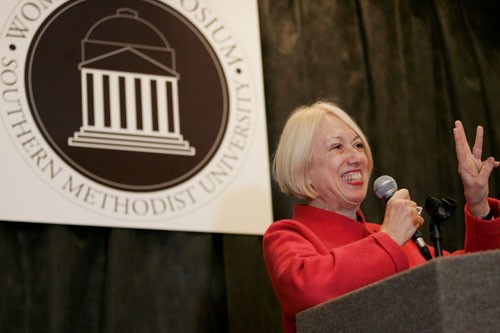
Symposium stresses women’s potential (Photo by John Schreiber, The Daily Campus)
Ann Crittenden, acclaimed writer and author, returned to her alma mater Thursday for her “Having it All: Our Families and Our Future” lecture at the 41st Annual Women’s Symposium at Southern Methodist University.
Crittenden, an SMU alum, shared her thoughts on the negative social and economic impact of child-rearing. Dallas business-women, mothers and SMU students alike, gathered in the Hughes-Trigg Student Center to listen as Crittenden proposed initiatives to bring working-world moms up to the socio-economic par.
Crittenden is a Dallas native who attended Highland Park High School and went on to SMU to major in history, religious studies and English. She earned her master’s degree in journalism and economics and a later Ph.D. in history from Columbia University. Crittenden pursued journalism as a career and has reported for the New York Times, Newsweek and Fortune magazines. However, she says she fully experienced the negative economic and social impact of a child when she became a mother.
“Oh my god, I forgot to have a baby,” Crittenden said about her decision to put a career before a child.
At the time Crittenden was at reporting for the New York Times, which was very generous in granting a six-month maternity leave, she said.
She said she soon realized motherhood was an “enjoyable sacrifice” but also a “very risky decision.” In fact, she realized how little her pre-baby world actually appreciated the new child and explains that she was “shed like skin off the back of a snake.”
So, she wrote her two books, “The Price of Motherhood” and “If You’ve Raised Kids, You Can Manage Anything,” which chronicled her experiences.
“Having a baby is the worst financial decision you can make,” Crittenden said.
She explained that mothers lose about $1 million of earnings in raising a child, something she calls the “mommy tax.” In addition, women with children are given fewer additions to social security, receiving zero credit for every year spent raising a child, as Crittenden personally experienced.
LeAnne Riley, of Central Dallas Ministries, a donor to the Symposium, sat in for Crittenden’s lecture to hear confirming facts about women like her, with children.
“I have three kids so in that sense, her lecture was depressing because she was talking about me, the single mother,” Riley said. “I had the low wages, and I sacrificed my education to take care of my kids.”
Crittenden said single mothers make up the majority of clients at food banks or on welfare and are at the biggest poverty risk.
“Mothers are the most vulnerable people in society,” she said.
Motherhood is often considered the most important job in the world, but Crittenden wonders why it is the job with zero pay. She explained that human capital accounts for over half of the wealth in worldly nations, but human skill is diminishing.
She emphasized that it takes time to raise a child, the same time which people are not able to take to earn an income.
Caroline Sullivan, an SMU sophomore in attendance, said, “Because it is not valued or taxed, motherhood is more valuable than any other profession. Women are making a huge sacrifice for children.”
The United States has very high levels of maternal and paternal poverty, according to Crittenden, which is a direct measurement of the value of the wellbeing of America’s women and children.
“We are 38th in line, near Cypress and Cuba,” she said.
Crittenden suggested a list of actions that, if taken, will change the attitudes of the nation and allow them to see “the value of a well-raised child.”
“Never attack other women; we are all in this together. Look at every policy from the vantage point of how it is good for mothers,” she said.
Dannele Pinson, of Central Dallas Ministries, said, “Attitudes may take longer to change, but the views may change because of the impoverished amount of women.”
Crittenden also pointed to other wealthy countries for their social policy regarding childbearing. Canada has a one-year maternal/paternal leave and has a lower illiteracy rate.
“The early years are the make-or-break years. Children are developed or stunted in the early years – a smart society would enable [mothers] – because love makes the world go ’round,” Crittenden said.
Crittenden ended her speech by saying, “Every time I mention my book, ‘If You’ve Raised Kids, You Can Manage Anything,’ people laugh. They say ‘Oh, It’s so true.’ But if it is true, then why is it a joke?”








